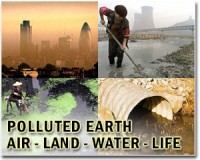| . |  |
. |
Budapest (AFP) Oct 6, 2010 A damburst of toxic sludge that killed at least four people and left scores needing treatment for chemical burns and other injuries could take up to a year to clean up, officials said Wednesday. "The clean-up and reconstruction could take months, even a year," Environment Secretary Zoltan Illes said. On Monday, the retaining walls of a reservoir at an aluminium plant in Ajka in western Hungary collapsed, sending a toxic soup of industrial waste cascading through seven villages. The devastation spread across an area of 40 square kilometers (15.4 square miles) in what officials say is Hungary's worst-ever chemical accident. Three adults and one child were killed and 123 people were injured, while three people are still missing. Karoly Tily, the mayor of Kolontar, the village where all four victims died, declared Wednesday a day of mourning, and the company which owned the reservoir, the Hungarian Aluminium Production and Trade Company (MAL), said it would foot the costs of the funerals. Illes told online publication Langlovak in an interview that the overall costs of the clean-up and reconstruction "could reach tens of millions of euros (dollars)." If MAL was unable to drum up the funds, "the sum will be borne by the Hungarian government, or it might be necessary to ask the European Union for aid," he said. The tidal wave of sludge overturned cars, swept away possessions and raised fears that pollution leeching from it could reach the Danube River, which courses through Croatia, Serbia, Bulgaria, Romania and Ukraine before flowing into the Black Sea. Late Wednesday officials said they were confident the contamination would not reach Europe's second longest river "If our calculations are right then by the time the sludge reaches the Danube contamination will be under the acceptable levels," Emil Jenak, president of Northern Transdanubian Water Management, told AFP. A pollution expert, quoted by the Hungarian news agency MTI, said rain and neutralising agents used so far had already led to a drop in alkaline levels in the Marcal river "and the connecting Raba will suffer much less damage" than feared. But environmental organisation Greenpeace detected lead, chrome and arsenic in samples taken from a tributary of the Marcal, the river Torma. The mud -- a residue from aluminium production which is highly corrosive and contains toxic heavy metals such as lead, cadmium, arsenic and chromium -- destroyed all vegetation other than trees and seeped into hundreds of houses in villages and contaminated waterways. A spokeswoman for the disaster relief services, Timea Petroczi, insisted that the drinking water system had not been affected, but "as a precautionary measure, people are not allowed to use the water wells". Residents were also banned from eating any home-grown produce or from hunting or fishing in the region, she said. Eyewitnesses say the force of the wave was so strong that cars were sucked out from their garages and it tore out windows and doors, covering everything. "I've lost everything. We've lost everything," said one man standing in front of the remains of his house, which he said he had just spent 5,000 euros (6,900 dollars) in renovating. Two days after the disaster, cars, debris and dead animals still littered streets and fields. "It is still chaos here, nobody knows what to do or where to start," said one volunteer worker. "I think it's a disgrace. Things are going so slowly. The flood was on Monday and now on Wednesday we're still waiting for orders," he said. National police chief Jozsef Hatala said the national bureau of investigation MNY would take over the probe into the accident "given the complexity and importance of the matter". MAL has suspended all operations at the plant amid suggestions that the spill was caused by too much sludge in the tanks. Company chief Zoltan Bakonyi warned that if production were not resumed soon, MAL could go bankrupt. The company is the sole large employer in the impoverished region and has a workforce of 1,100.
Share This Article With Planet Earth
Related Links Our Polluted World and Cleaning It Up
 Hungary declares emergency as toxic mud spill kills four
Hungary declares emergency as toxic mud spill kills fourBudapest (AFP) Oct 6, 2010 Hungary declared a state of emergency after a toxic mud spill swamped seven villages killing four people and injuring 120 in what officials said was the country's worst-ever chemical accident. Eight of the injured were in a serious condition and six people were missing after the walls of a reservoir of residue at an aluminium plant broke on Monday afternoon. Officials feared the death toll c ... read more |
|
| The content herein, unless otherwise known to be public domain, are Copyright 1995-2010 - SpaceDaily. AFP and UPI Wire Stories are copyright Agence France-Presse and United Press International. ESA Portal Reports are copyright European Space Agency. All NASA sourced material is public domain. Additional copyrights may apply in whole or part to other bona fide parties. Advertising does not imply endorsement,agreement or approval of any opinions, statements or information provided by SpaceDaily on any Web page published or hosted by SpaceDaily. Privacy Statement |